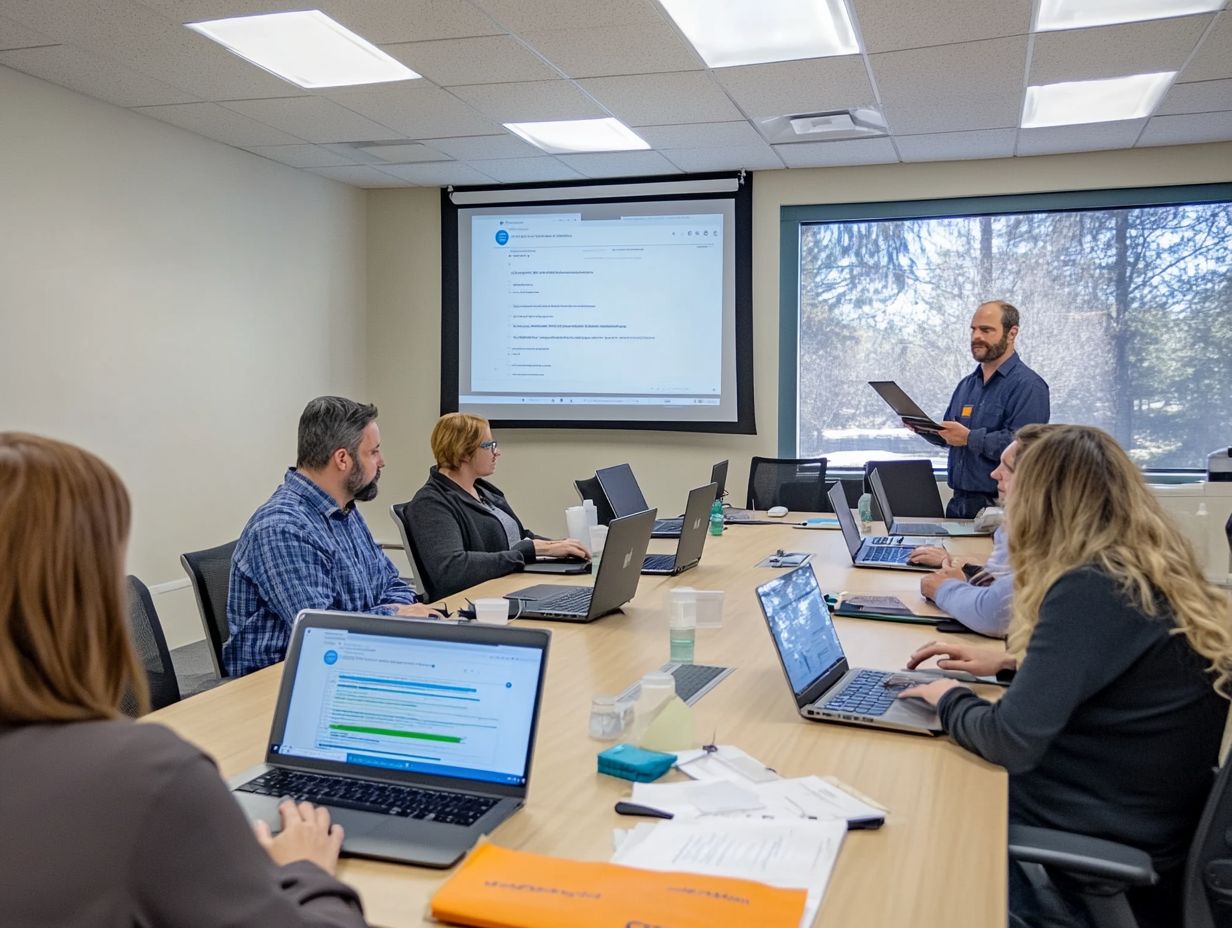How to Train Employees on CRM Software?
Training your employees on CRM software is essential for unlocking its full potential and ensuring smooth business operations.
With a range of training methods at your disposal, including on-site and online options, you can customize your approach to fit your organization’s unique requirements.
This article delves into the key elements of effective training, such as pinpointing training needs, developing structured plans, and actively engaging employees.
Implementing best practices that promote learning, like hands-on simulations and continuous support, will empower your team and pave the way for CRM success.
Contents
- Key Takeaways:
- Why is Training Important?
- Types of CRM Software Training
- Key Components of Effective CRM Software Training
- Best Practices for CRM Software Training
- Frequently Asked Questions
- What is the importance of training employees on CRM software?
- How should I determine the training needs of my employees for CRM software?
- What are the different methods of training employees on CRM software?
- How often should I provide training on CRM software?
- What are some tips for successful training on CRM software?
- What are common challenges when training employees on CRM software?
Key Takeaways:

- Effective CRM software training boosts productivity.
- Utilize both on-site and online training for flexibility.
- Identify training needs, create a plan, and engage employees.
Why is Training Important?
Training is crucial for organizations eager to boost their employees’ performance and enhance overall business efficiency, especially within CRM systems such as Salesforce and Zoho.
Mastery of these platforms is vital for effective management of customer data and relationships.
When employees receive proper training, they will be well-equipped with the skills and knowledge necessary to navigate complex CRM tools, implement innovative strategies, and engage users during CRM training effectively.
Focusing on training improves customer satisfaction and retention rates.
By investing in comprehensive training programs, you can drive significant improvements across various metrics, including sales conversion rates and response times.
When your team becomes familiar with CRM features, they are more likely to utilize automated workflows, ensuring timely follow-ups and personalized communication with customers.
This not only boosts employee confidence but also enhances your business development initiatives.
As team members grasp the nuances of data analytics within CRM platforms, they can extract actionable insights that inform both marketing campaigns and sales strategies.
Ultimately, a well-trained workforce translates to a more effective management process, ensuring that both employee performance and customer satisfaction reach new heights.
Types of CRM Software Training
You ll find various types of CRM software training programs available, such as on-site training and online training, each meticulously crafted to meet the diverse needs of users within organizations.
Leading CRM platforms like Salesforce, Zoho, and HubSpot offer tailored training solutions to help you and your team become well-acquainted with the systems, enabling you to harness their full potential in managing customer relationships with finesse.
On-Site Training
On-site training offers a hands-on learning experience that immerses employees in CRM systems, creating customized workshops tailored to the unique needs of your organization.
This approach allows users to apply their newly acquired knowledge in a familiar environment, facilitating immediate feedback and adjustments that effectively enhance their skills.
The interactive nature of on-site training cultivates a collaborative atmosphere where participants can engage in discussions about real-world challenges and share valuable insights, enriching the overall learning experience.
By tailoring the content to align with your specific workflows, you can utilize various workshop-style formats that break down complex concepts into easily digestible segments.
This flexibility accommodates different learning styles and actively encourages participation.
Collecting feedback from attendees during and after the training sessions provides invaluable insights, enabling your organization to continuously refine its training processes and ensure that the lessons remain relevant and impactful.
Online Training

Online training for Customer Relationship Management (CRM) systems provides unmatched flexibility and accessibility, allowing you to learn at your own pace through engaging videos, comprehensive documentation, and a wealth of online resources.
This format gives organizations the power to reach a wider audience while supporting ongoing development, offering essential insights into CRM processes and best practices.
By incorporating a diverse range of media formats, this training keeps you engaged and motivated, transforming the learning experience into something dynamic and interactive.
You have the freedom to revisit complex topics whenever needed. Immerse yourself in simulations that replicate real-world CRM scenarios.
This immersive training accelerates your learning curve and fosters a deeper understanding of how to apply these tools in daily tasks.
Ultimately, customizing your learning journey nurtures a culture of continuous improvement and equips you with the skills to enhance customer relationships.
Key Components of Effective CRM Software Training
Effective CRM software training involves key elements to consider. Start by identifying the specific training needs within your organization.
Next, develop a comprehensive training plan that addresses these needs directly. Engaging employees actively transforms the learning experience into something dynamic and meaningful.
Establishing a clear framework helps you tailor your training sessions to meet the unique roles and requirements of your team. This ensures that employees receive the resources and support they need to thrive in using CRM systems effectively.
Identifying Training Needs
Identifying your training needs is crucial for crafting an impactful CRM training program. It involves assessing what skills your employees need regarding CRM software usage.
This approach ensures that the training aligns with your organization s goals and enhances overall employee performance by addressing individual learning requirements.
By using methods like surveys, performance evaluations, and one-on-one interviews, you can uncover valuable insights into the existing competencies and challenges your employees face.
With a comprehensive understanding of these roles, you can identify precise areas for improvement. This leads to a training program that is relevant and effectively addresses skill gaps.
Implementing targeted training strategies based on these evaluations empowers your employees to utilize CRM systems more efficiently. This, in turn, fosters a productive and cohesive workplace environment that excels in effective customer relationship management.
Creating a Training Plan
Creating a structured training plan is essential for ensuring comprehensive guidance on effectively utilizing CRM systems. Think of this plan as your personal roadmap to mastering CRM systems!
Define learning objectives that align with your organization s goals. Establish a realistic timeline to set expectations for completion, allowing you to engage with the material at a pace that fosters deep understanding.
Curating a selection of resources such as instructional videos, manuals, and FAQs equips you with various learning tools tailored to different styles. Proper documentation throughout your training aids comprehension and ensures you can revisit critical content as needed, ultimately reinforcing your knowledge and skills in navigating the CRM system.
Engaging Employees in Training

Engaging in training programs is essential for you to maximize the impact of CRM software training. By fostering a motivated learning environment, you encourage active participation.
Employing techniques such as interactive sessions and ways to gather opinions regularly ensures that you re not just absorbing information but also applying your knowledge in real-world scenarios.
Incorporating hands-on activities allows you to grasp and retain complex concepts related to CRM systems more effectively.
When you participate in role-playing exercises or group discussions, you re likely to feel a stronger connection to the material, enhancing your overall engagement.
Continuously asking for feedback gives you the power to refine your learning experience. This tailors it to the unique needs of your team. This collaborative approach boosts your confidence and leads to improved performance, equipping you to utilize CRM tools effectively in your daily tasks.
Best Practices for CRM Software Training
Implementing best practices for CRM software training is crucial for equipping employees with the skills necessary to manage customer relationships effectively.
By prioritizing hands-on learning and providing ongoing support, you can transform the training experience.
Integrating these practices into your training process enhances employee engagement and performance. This also maximizes the overall impact of your CRM systems.
Utilizing Simulations and Hands-On Learning
Utilizing simulations and hands-on learning in your CRM training significantly enhances practical knowledge application. Experimenting with the software in a controlled environment allows for deeper engagement.
This approach enables you to explore various functionalities, leading to improved competence and confidence in managing customer relationships.
For example, incorporate role-playing scenarios where you interact with virtual customers. Addressing inquiries and resolving issues in real time will enhance learning.
Creating case studies that mimic real-world business challenges encourages collaboration and ignites your team’s creative problem-solving skills.
These practical exercises reinforce theoretical concepts and foster a sense of ownership and accountability among participants, making the learning experience more relatable and impactful.
Ultimately, this method enriches the training program and cultivates a highly skilled workforce, ready to tackle real-world CRM challenges with confidence.
Providing Ongoing Support and Resources
Providing ongoing support and resources is essential for sustaining your performance in utilizing CRM software. It ensures you have access to the tools and documentation for continuous learning.
This support system helps you tackle challenges as they arise and encourages your ongoing engagement in professional development.
Effective training should include accessible helpdesk assistance, allowing you to seek real-time solutions for any issues you encounter.
Regular refresher sessions can reinforce your knowledge and keep you updated on new features. This ensures your skills remain sharp and relevant.
Together, these elements create a safety net that gives you the power to overcome obstacles with confidence.
This ongoing support creates a culture where you can adapt and thrive, enhancing your overall performance. You can maximize the potential of your CRM tools.
Frequently Asked Questions

What is the importance of training employees on CRM software?
Training employees on CRM software helps them understand and effectively use its features and tools. For optimal results, consider how to train your team on CRM best practices. This leads to improved customer relationship management, increased productivity, and better overall business performance.
How should I determine the training needs of my employees for CRM software?
It is important to conduct a needs assessment to identify your employees’ specific training needs. This can include their current skill level, job responsibilities, and goals for using the CRM software.
What are the different methods of training employees on CRM software?
The most common methods are in-person training, online courses, video tutorials, and user manuals. Choose the method that best fits your employees’ needs and learning styles.
How often should I provide training on CRM software?
Start with initial training when you implement new Customer Relationship Management software. Offer refresher training annually or whenever there are significant updates.
What are some tips for successful training on CRM software?
Set clear objectives and provide hands-on training. Allow time for practice, questions, and continuous learning resources.
What are common challenges when training employees on CRM software?
Challenges may include resistance to change, difficulty understanding complex features, and time or resource constraints. Address these issues to ensure successful training and adoption.






